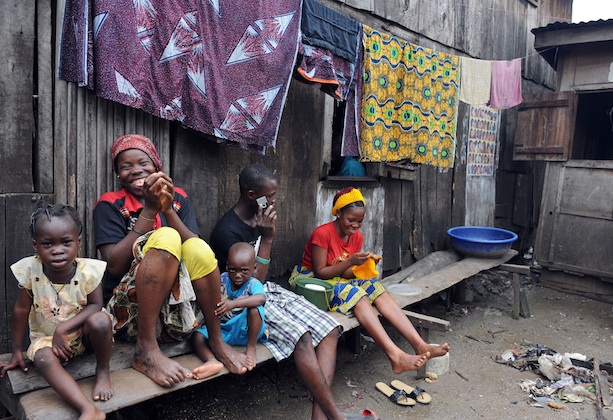The term ‘419’ is drawn from the article in the Nigerian penal code that addresses fraud. However, it has transcended its origins in statute and become shorthand for trickery across West Africa. When I worked as a correspondent in Sierra Leone, 1,400 miles from Nigeria’s capital Abuja, the phrase was in widespread use.
Deception is fertile ground for fiction, and Will Ferguson has produced a fine novel from the West African variant. He takes 419 in its purest form: the email scam. Nigerian hustlers persuade foreigners to part with their savings, often with the promise of a tranche of a fortune that just needs a western bank account to park in.
Here the bait is 15 per cent of ‘THIRTY FIVE MILLION SIX HUNDRED THOUSAND dollars US,’ thus capitalised in a transatlantic email exchange. The scammer is Winston, a young operator in Lagos, Nigeria’s muggy commercial capital. Winston’s victim is Henry Curtis, a retired Canadian schoolteacher.
The novel opens as Curtis’s car plunges down an embankment. A police investigation indicates suicide, as a result of financial ruination. The Canadian authorities advise that Nigeria is such a maelstrom that redress is impossible. Curtis’s daughter Laura disregards them and flies to Lagos. Without spoiling the plot, suffice it to say that, by and large, Laura turns the tables on the scammers.
Ferguson makes extensive use of parallel narratives. In Canada, exposition of the fraud folds back from the initial car crash, while in Africa a pregnant girl called Amina treks south from the Sahel. She eventually meets Nnamdi, who has himself emerged from Nigeria’s oil-producing delta. This ambitious structure in general works, and the dénouement, when the strands twist together, is genuinely thrilling.
However, earlier pacing is problematic. Amina’s trudge — ‘every step now would be a blind step off a tall wall’ — is over-extended. Likewise, while the description of the degradation engendered by oil in the Niger delta is colourful — ‘sometimes, after the gas is flared, the rains that come down itch the skin’ — Ferguson overplays his point that exploitation in Africa is a two-way street.
These patches of heavy-handedness are striking because elsewhere Ferguson handles his material with considerable finesse. He dissects the position of 419 operators in Nigerian society, both derided as fraudsters and lauded for their entre-preneurship. A song with the lyrics ‘419, play the game; 419, all the same,’ becomes a repeated refrain, in an effective example of that old writing-school diktat to show not tell.
Ferguson’s greatest achievement, though, is his depiction of the African cityscape. He draws squalor — ‘pools of urine in littered lots, open sewage running through drains and ditches’ — but also recognises that Lagos is not chaos. There are webs of allegiance and patronage, as in any human society. His description of the network of ‘area faddahs’ who control each neighbourhood shows a laudable ability by an outsider to see beyond the mad surface.
There are themes that merit further exploration. Ferguson describes the code of the 419 players — ‘we who traffic in falsehoods must put a premium on the truth’— but only touches on the broader societal consequences of absent trust in African societies. He grants a cameo to a Lebanese character, but does not assess the way Levantine commercial dominance in West Africa is predicated on intra-group trust. Lebanese businessmen often are, as Ferguson writes, the sort of people ‘who could grow fat in a famine’. But they only prosper because, to other Lebanese, their word is their bond.
There are some stylistic problems too. In particular the rhetorical question, a device which should have no place in serious fiction, appears on multiple occasions. However, 419 remains a fine novel and deserves a wide readership.






Comments